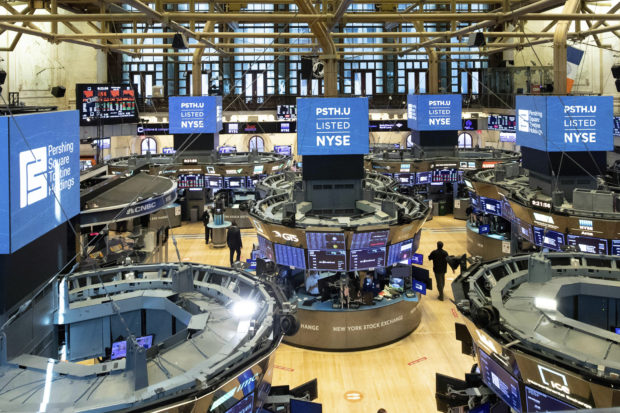
NYSE Photo by Colin Ziemer via AP
Fund management firm Sun Life Asset Management Co. Inc. (Slamci) has launched a new mutual fund that allows aggressive investors with a long-term horizon to own stocks of the world’s largest companies like Apple, Microsoft, Amazon, Facebook and Google.
This is by buying into a peso-denominated fund, Sun Life Prosperity World Equity Index Feeder (WEIF) Fund, that in turn feeds 90 percent of its assets under management into an exchange-traded fund that tracks MSCI All Country World Index, the flagship global equity index of widely tracked index provider MSCI.
In a press briefing last week, Slamci president Valerie Pama said WEIF—the 16th in Slamci’s roster of funds—would allow investors to further diversify their portfolio. Apart from ensuring that an investor’s money is spread out across different investment products, Pama noted that diversification also meant seeking offshore opportunities.
“The volatility prevalent in the Philippines does not affect stocks and bonds overseas, so by having investments in various parts of the world, you can reduce risks, such as unpredictable natural calamities or adverse change in the political environment,” she said.
The new fund targets a relatively more experienced and higher-end investor segment. The minimum investment is P50,000 while additional investment is in increments of P10,000.
“This WEIF gives clients an opportunity to participate in the global market in a passive basis,” said Michael Gerard Enriquez, chief investment officer at Sun Life of Canada Philippines Inc.
With index funds growing in popularity, like the Philippine Stock Exchange index funds, Enriquez said this made Sun Life realize there were a lot of opportunities in diversifying one’s portfolio beyond the Philippine market.
“We have made this product easily accessible by being able to accept peso, which addresses two concerns- first investors having a hard time converting their peso into dollars and looking for a dollar investment,” Enriquez said.
While he would personally favor investing in actively-managed funds when it comes to local stocks, Enriquez said investing in a passive fund would be the most cost-effective way of investing in global equities.
SLAMCI product development manager Dino Macasaet said WEIF would charge a total fund management and distribution fee of 1 percent per annum, similar to the fees charged by the company’s PSEi-tracking fund. The fee is accrued daily and is included in the net asset value computed for the day.
“Buying into equities makes you into an owner. Your basic premise here is you should be investing in more things which grow earnings rather than things with potentially flat or declining earnings,” said SLAMCI head of global funds Mikko Vergara.
The new fund feeds the SPDR MSCI ACWI UCITS, an exchange traded fund launched in 2011 and managed by State Street Global Advisors. The objective of the fund is to track the equity performance of developed and emerging markets.
SPDR MSCI’s top investee companies are Apple, Microsoft, Amazon, Facebook, Alphabet (parent company of Google), Alibaba, Johnson & Johnson, Tencent Holsings Ltd. and Visa Inc.
In terms of sector breakdown, the fund is most heavily invested in technology (20.65 percent), financials (13.54 percent), healthcare (13.03 percent) and consumer discretionary (11.77 percent) sectors as of end-June.
By geographical location, the fund is heavily skewed towards the US, which has a 57.6-percent share of investments, while Japan and China accounted for 6.96 percent and 4.91 percent, respectively, as of end-June.INQ